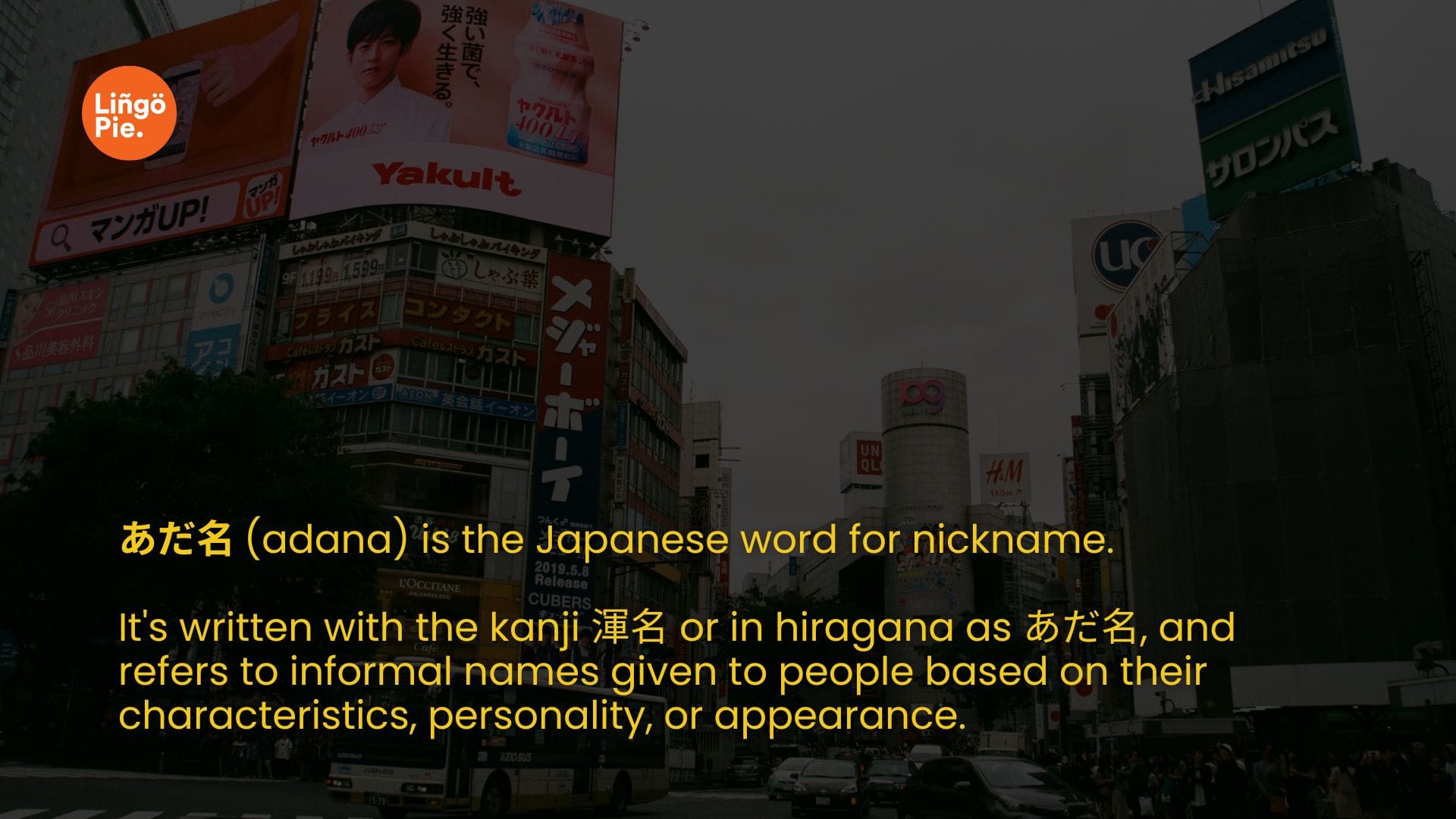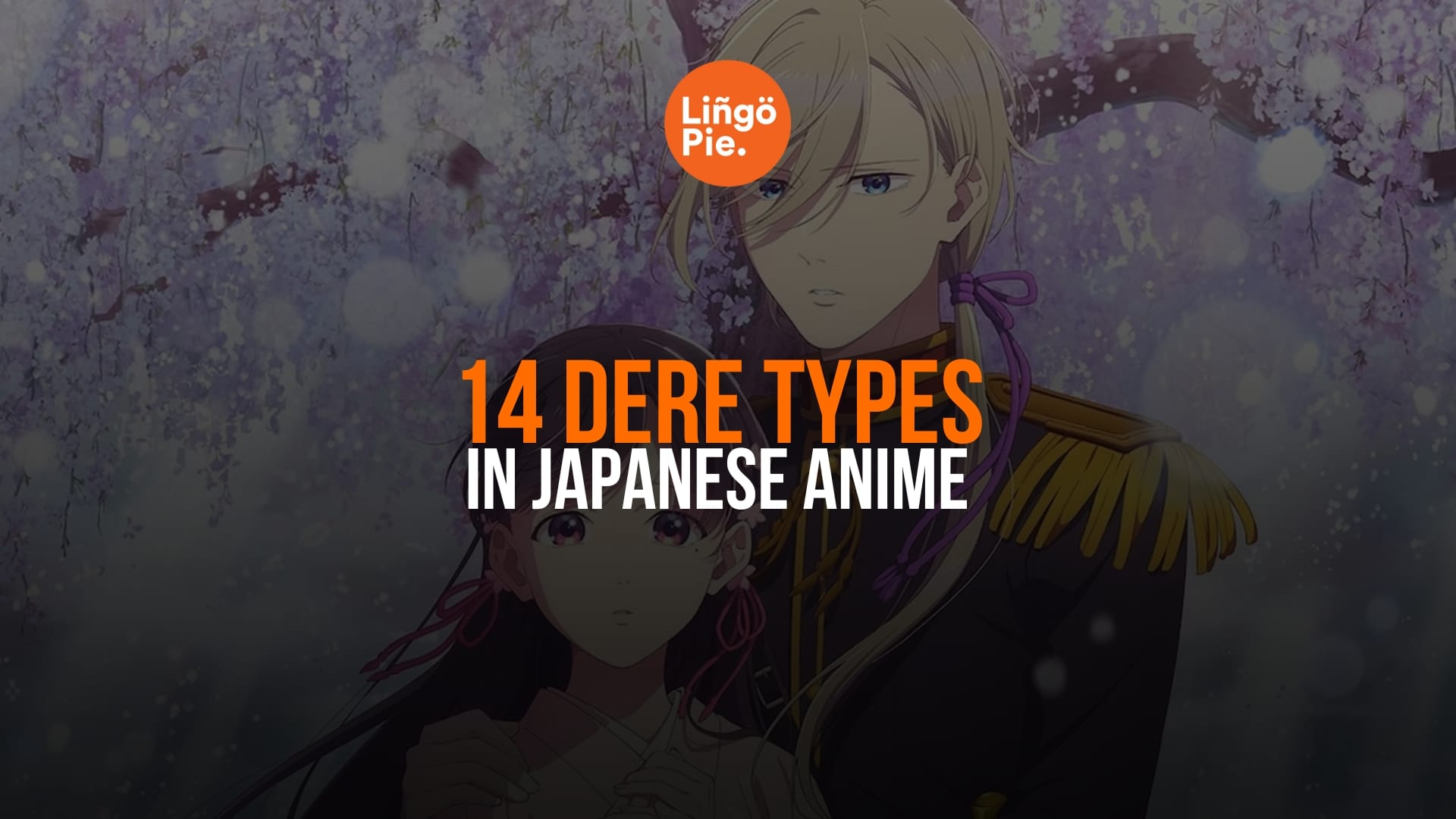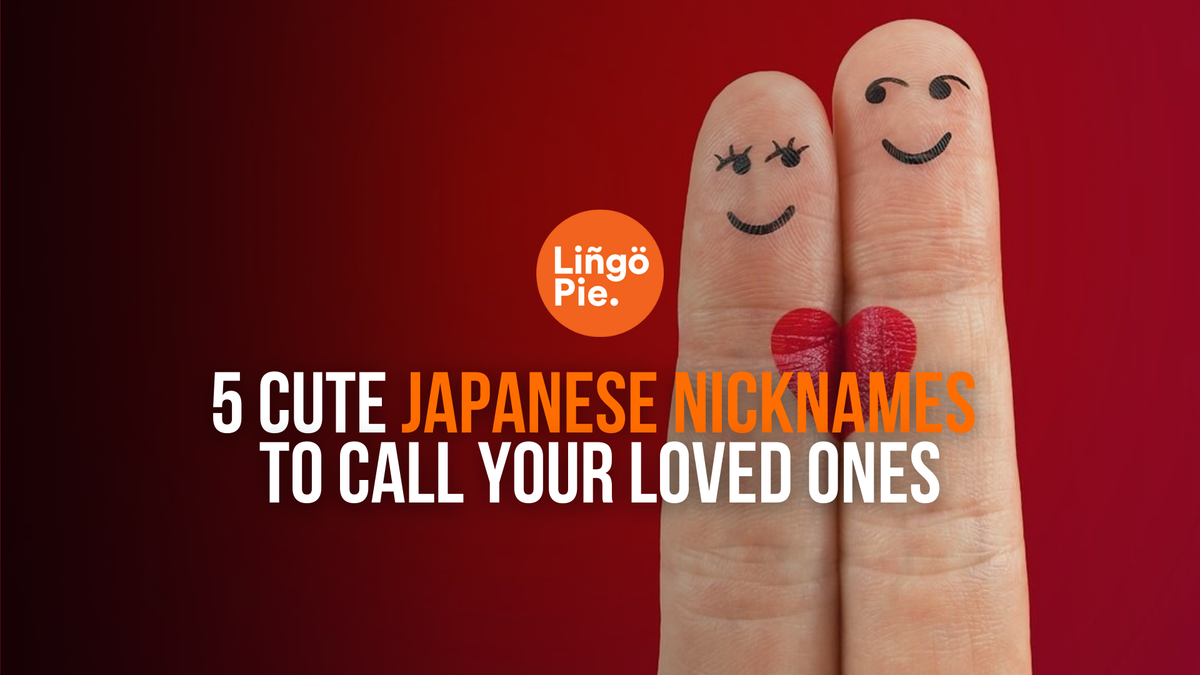If you've been watching anime or studying Japanese, you’ve probably noticed people rarely call each other by their full names. Instead, they use all sorts of modified versions with special endings attached. For instance, Ai Scream’s latest song, called "愛♡スクリ~ム!”, consistently uses the end "-chan."
In this post, we’ll talk about Japanese nicknames and the special endings you can actually use to show your relationship. We'll also add some tips about their usage so it won’t sound awkward when you try them out.
Japanese Valentine's Day Guide
Best Tv Shows to Learn Japanese on Netflix [For Beginners]
How to Say Happy Birthday In Japanese In 7+ Easy Ways

Understanding Japanese Nicknames vs. Honorifics
Before we dive in, let's clear up something important: the difference between honorifics and nicknames. Basically, honorifics like -san, -kun, and -sama are respect markers attached to names. They’re not nicknames but social indicators (like "Mr." or "Mrs." but with more nuance).
| Honorific | Basic Usage |
|---|---|
| -さん (-san) | Standard polite suffix (equivalent to Mr./Ms.) |
| -先生 (-sensei) | For teachers, doctors, and other professionals |
| -様 (-sama) | Very formal/respectful (for customers, boss, emperor, deities, etc.) |
| -先輩 (-senpai) | For senior students/colleagues |
| -後輩 (-kōhai) | For junior students/colleagues |
While some honorifics like -kun and -chan can be used in nickname formation, their primary purpose is to indicate social relationship rather than to create a playful or affectionate variation of someone's name.
On the other hand, nicknames (あだ名/adana or ニックネーム/nikkuneemu) in Japanese typically involve modifying someone’s actual name through shortening, adding specific endings, or playing with the sounds. They’re used between friends, classmates, family members, and romantic partners to show closeness and affection.

Common Nickname Formation Patterns in Japanese
Adding -kun/-chan
This is perhaps the most common way to form nicknames in Japanese. -chan (ちゃん) is a diminutive suffix used for children, young women, close friends, or anything considered cute. On the other hand, -kun (くん) is used primarily for boys and young men, but also by seniors addressing juniors in schools or workplaces.
Since many Japanese names have 3-4 syllables, they're often shortened to the first 1-2 syllables before adding an appropriate suffix. The process works like this:
- Take the first 1-2 syllables of the first or japanese last names
- Sometimes add a small つ (tsu) to double the following consonant for better flow
- Add an appropriate ending like -くん (-kun) for boys or -ちゃん (-chan) for girls
This technique is extremely versatile and works for both first and last names. The small つ (tsu) creates a natural rhythm when added.
- 佐藤 (Satō) → さっちゃん (Sacchan) ♀
- 直樹 (Naoki) → なおくん (Nao-kun) ♂
- 山田 (Yamada) → やまちゃん (Yama-chan) ♂♀ (last name)
- 健太郎 (Kentarō) → けんくん (Ken-kun) ♂
Note that is common to write the shortened form in Hiragana or Katakana instead of Kanji and sometimes a small つ/ツ for double consonant or a long vowel sound is added, like in セッちゃん or マーちゃん (Ma-chan).
Adding -cchi (-っち)
This cute-sounding ending is another popular option for creating affectionate nicknames between close friends. You can add it to:
- The full first name
- Just the first couple syllables
- Occasionally a last name
Anime fans might recognize this pattern from series like "Kuroko no Basket" where character Kise adds "-cchi" to names of people he respects. It creates a playful but respectful dynamic that's distinct from the more generic -chan or -kun endings.
- 大輔 (Daisuke) → だいっち (Daicchi) ♂
- 奈緒 (Nao) → なおっち (Naocchi) ♀
- 千春 (Chiharu) → ちはっち (Chihacchi) ♀
Adding -n (-ん) and -rin (-りん)
This pattern works especially well with names that end in certain sounds:
- Names ending in り (ri)
- Names ending in の (no)
- Names ending in る (ru)
The -rin ending is particularly effective for creating cute, friendly nicknames and is especially popular for female names.
- 光 (Hikari) → ひかりん (Hikarin) ♀
- 明日香 (Asuka) → あすかん (Asukan) ♀
- まり (Mari) → まりん (Marin) ♀
- 聡 (Satoshi) → さとりん (Satorin) ♂
Adding -tan (-たん) and -chin (-ちん)
These are cutesy, childish variations of -chan that have interesting origins:
- -tan (-たん) began in otaku internet culture, used for anime characters
- -chin (-ちん) is another baby-talk variation often used for pets and children
Both have expanded beyond their origins and are now used more widely, especially for cute nicknames among friends. The -chin ending is often used for pets and babie,s but can be used affectionately between friends too, especially for female nicknames.
- 美咲 (Misaki) → みさたん (Misatan) ♀
- 隆太 (Ryūta) → りゅうたん (Ryūtan) ♂
- 春菜 (Haruna) → はるちん (Haruchin) ♀
- 大地 (Daichi) → だいちん (Daichin) ♂
Creative Japanese Nickname Endings
Japanese nickname creativity doesn't end with the basic patterns! Here's a more comprehensive list of nickname endings you'll encounter in anime, manga, and real Japanese conversations:
| Ending | Romanized | Example |
|---|---|---|
| -ぴ | -pi | 智子 → ともぴ (Tomoko → Tomo-pi) |
| -みゅ | -myu | 亜美 → あみゅ (Ami → A-myu) |
| -ぴょん | -pyon | 陽子 → よーぴょん (Yōko → Yō-pyon) |
| -ぽこ | -poko | 秀樹 → ひでぽこ (Hideki → Hide-poko) |
| -ぺこ | -peko | 遥 → はるぺこ (Haruka → Haru-peko) |
| -にゃ/-にゃん | -nya/-nyan | 恵 → めぐにゃん (Megumi → Megu-nyan) |
| -くま | -kuma | 純也 → じゅんくま (Jun'ya → Jun-kuma) |
| -まる | -maru | 大介 → だいまる (Daisuke → Dai-maru) |
| -はん | -han | 京子 → きょうこはん (Kyōko → Kyōko-han) |
| -やん | -yan | 哲也 → てっちゃやん (Tetsuya → Teccha-yan) |
| -べえ | -bē | 勇太 → ゆうべえ (Yūta → Yū-bē) |
| -きゅん | -kyun | 涼太 → りょうきゅん (Ryōta → Ryō-kyun) |
| -ちゅん | -chun | 真由美 → まゆちゅん (Mayumi → Mayu-chun) |
| -ぬ | -nu | 太郎 → たろぬ (Tarō → Taro-nu) |
| -すけ | -suke | 健 → けんすけ (Ken → Ken-suke) |
| -たろう | -tarō | 和也 → かずたろう (Kazuya → Kazu-tarō) |
Popular Japanese Nicknames
Wondering about the common Japanese nickanames you'll hear in Japane anime? Check out these 10 most common ones.

- Acchan (あっちゃん) - A common nickname for people whose names start with "A" like Ayumi or Atsushi
- Takkun (たっくん) - Popular nickname for boys named Takuya, Takeshi, or other "Ta-" names
- Miichan (みーちゃん) - Common for girls with names starting with "Mi" like Misaki or Miyuki
- Yuu/Yū (ゆう) - A short nickname for names like Yuusuke, Yuuta, or Yuuki
- Kei-chan (けいちゃん) - Used for people named Keiko, Keiichi, etc.
- Maru (まる) - A cute nickname meaning "circle," sometimes used regardless of the person's actual name
- Hana (はな) - Meaning "flower," used as a nickname for girls with various names
- Shun (しゅん) - A short form for names like Shunpei, Shunsuke, etc.
- Non-chan (のんちゃん) - Often used for girls named Nonoka or similar names
- Dai (だい) - Short form for names like Daisuke or Daiki
These are actual nicknames commonly used among friends and family in Japan, rather than just the suffix patterns used to create nicknames.

Japanese Terms Of Endearment

Unlike English, which has an abundance of generic pet names like "honey," "babe," or "sweetheart," Japanese culture has relatively few all-purpose terms of endearment. In fact, influenced by the English.
| Term | Pronunciation | Meaning & Usage |
|---|---|---|
| あなた | Anata | Literally "you," but when used by a wife to her husband becomes a term of endearment similar to "dear" |
| ダーリン | Dārin | Borrowed from English "darling," occasionally used between couples but not as common as in Western countries |
| ハニー | Hanī | Borrowed from English "honey," used mainly by younger couples influenced by Western media |
| 愛しい人 | Itoshii hito | "Beloved person" - a more literary/poetic expression for a romantic partner |
| 大切な人 | Taisetsu na hito | "Important person" - a sincere way to refer to someone you care deeply about |
It's important to note that anime and manga often portray more exaggerated or dramatic terms of endearment than what's typically used in real-life Japan. Terms like "Master" (ご主人様/goshujin-sama) that appear in certain anime genres are rarely used in actual relationships.
How often do Japanese people use nicknames?
It depends. In the case of suffixes like くん and ちゃん, they're always used when addressing a loved one. This includes family members and the suffix ちゃん.
However, words like あなた, ハニー or ダーリング are rarely used because culturally, Japanese people tend to be shy when showing their feelings to others. Of course, this shyness always depends on the person and even the region we're talking about. But generally speaking, that's what happens.
This also happens with the phrase 愛してる aishiteru ("I love you"), so common in Japanese romantic doramas, anime and songs. Actually, the phrase isn't used as much as you may think because Japanese prefers nuance over straight answers and because it isn't needed: if we two get along and have chemistry, you don't need words to express what is obvious.
Nevertheless, that doesn't mean that Japanese people can't express emotions. They just express them differently.
Want To Learn More?

If you’re interested in deepening your understanding of Japanese nicknames, terms of endearment, and how they’re used in everyday conversation, there’s no better way than immersing yourself in authentic Japanese content.
Try Lingopie to learn Japanese through TV shows and movies with interactive subtitles. You’ll hear real examples of these nicknames and endearment terms being used in context, which makes them much easier to understand and remember. Watching how characters interact and address each other in different relationship dynamics will give you a natural feel for the nuances we’ve covered in this article.
With engaging content and learning tools designed specifically for language learners, platforms like Lingopie help you absorb these cultural and linguistic elements organically—the way native speakers do.








![12 Best Japanese TV Shows To Learn Japanese [2026]](/blog/content/images/size/w300/2023/09/C-pia-de-imgs-blog---Spanish-1--10-.png)
![How To Write The Japanese Kanji For Love [+ FREE Printable]](/blog/content/images/size/w300/2025/03/Japanese-Kanji-for-Love-1.jpg)

